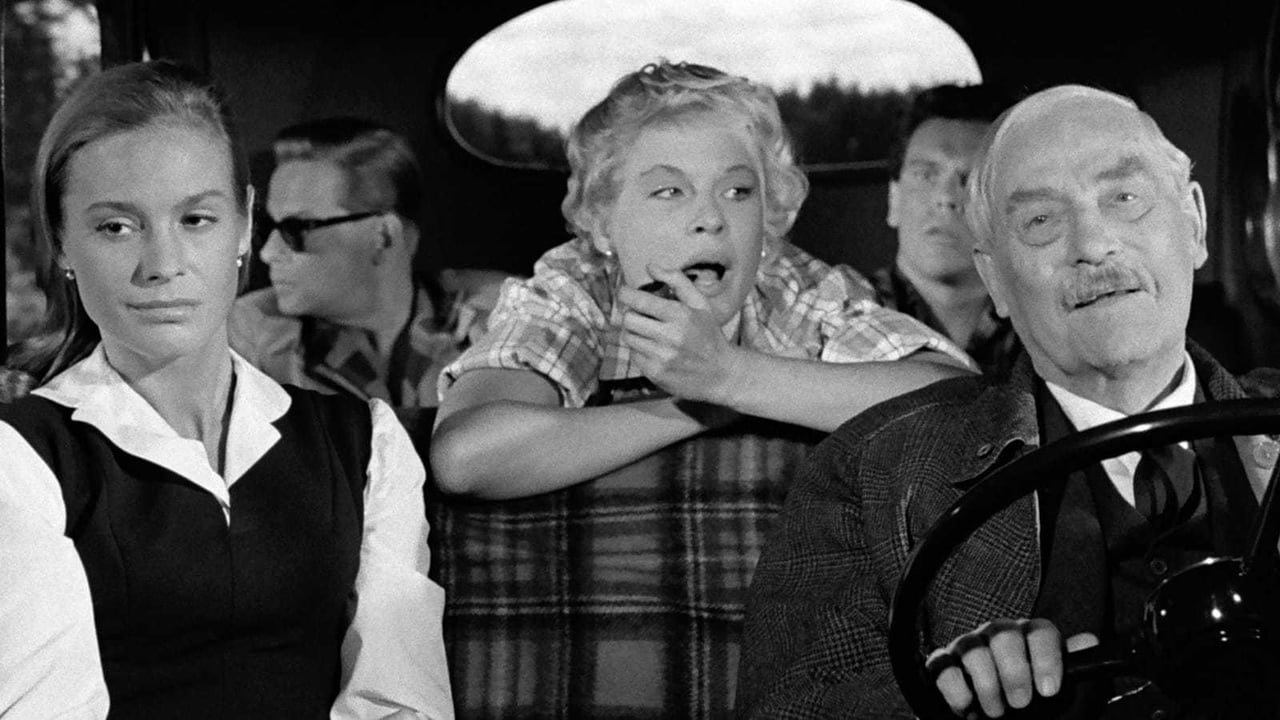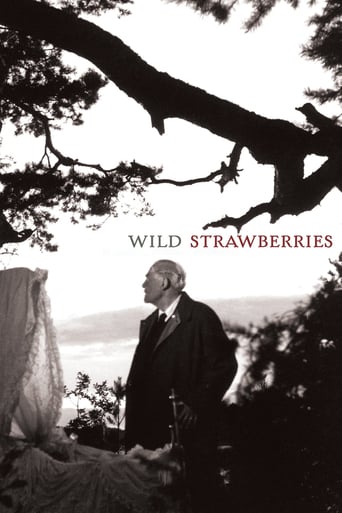

one of my absolute favorites!
... View MoreLack of good storyline.
... View MoreThe film makes a home in your brain and the only cure is to see it again.
... View MoreThe storyline feels a little thin and moth-eaten in parts but this sequel is plenty of fun.
... View MoreGreetings from Lithuania."Wild Strawberries" (1957), created by a legendary Ingmar Bergman reflects on life, death, childhood and what it takes to achieve a lot in your life via carrier, but missing upon beautiful moments in your life and most important family - all this is seen trough the eyes on an old man. That said, this is a very easy movie to watch - its beautifully acted written and directed. Also while the themes i mentioned can sound hard, this movie is lighthearted and kinda makes you think after it ends about your life - where you are at this moment and that it shouldn't be to late to change it if you don't want to end up as this old man of whose carriers achievements appreciation comes not from a family, but a young unknown people with a heart.Overall, "Wild Strawberries" is a superbly involving, smart, moving movie that you will definitely can see and appreciate it. Great movie.
... View More... because Dr. Isak Borg, apparently both an M.D. and a professor, is extremely self-aware. In the opening minutes of the film he admits he has allowed himself to become isolated from others and declares that his most annoying characteristics are being a pedant and thinking that women should not be allowed to smoke in the car. He has one son, also a doctor, and his wife Karen has been dead for many years.Professor Borg is supposed to get an honorary degree in Lund that evening, and after waking from a horrifying dream that seems to be about death and loss of identity that only Ingmar Bergman could cook up, decides at 3AM to drive his car rather than fly as originally planned. His housekeeper of 40 years has a fit and he teases her that she is carrying on like a wife. In spite of the early hour his only son's wife, who is staying with him, asks to come along too.So off they go at dawn for the long drive up the coast. In fact, I found Professor Borg to be a good guy. His daughter-in-law, who is his guest, talks about how ruthless he is. I'm sorry I just don't see it. When they stop at a gas station the young attendant talks about how Borg is still remembered from decades before when he was a physician there and insists on paying for his gas. Borg cheerfully invites a young girl named Sara and her two male companions to ride with them as far as Lund - they are going to Italy together. When the group is sideswiped by a couple, Borg invites them to ride with them. It is only because the husband berates his wife to the point that she hits him repeatedly that they are asked to leave, and then it is the daughter in law who does the asking.Borg makes various stops. He stops at his summer home as a child and revisits, not a memory, but an episode he could not have seen or heard because he was elsewhere at the time, between his first and true love Sarah and his brother Sigfrid, as he tries to steal her away from Isak with some bold physical behavior and must have won, because the two went on to marry and have six children. Yet, Borg does not seem angry. Instead you see a trace of a smile and nostalgia on his face, especially when he sees Sara in tears talking to her cousin about Isak's sweetness versus Sigfrid's physicality and how she is horrified that she is attracted to the latter. This is really the only pleasant dream/daydream/memory of the several along the way. In the end I figured that the young girl and her two struggling paramours are probably signifying Isak, Sigfrid, and Sara in his youth, and the feuding couple probably represents Borg's own unhappy marriage in which, after seeing how he felt about Sara and how he must have felt losing her to his own rather boorish brother, the wife could not have helped but feel like anything but the back up plan. Isak and Karin had only the one child, their son, compared to Sigfrid's six. His own son, married for many years, has none. It's like Bergman is equating fertility to connectivity, not just to a spouse, but to people in general. In the end, it's not like Isak Borg was a bad person who redeems himself because of all of these dreams and touches with the distant past, but he does seem more at peace with his past as he readies for bed that night.I'd highly recommend it. I'm no expert on Swedish cinema or Bergman at all, but I thought it was interesting how Bergman seems to be saying that Borg's "wrong turn", if there was any at all, could be traced back to losing his first and true love to his own brother, and that everything after that just fed off of that disappointment. As I look back on my life, I think that I can agree with that assessment.And now a word about the daughter-in-law. She accuses Isak of having said some just horrible things. Things he does not remember saying and things the audience never hears. Perhaps she wants to blame her husband's bleak and icy behavior on someone and Isak is convenient? At any rate, by journey's end she has warmed to Isak enough to confide in him about a great turmoil in her marriage. This was more of a change in her than any change I saw in Isak. This one is really worth a look, even if you normally aren't into foreign film. My review is just my take on the plot. I'm sure it means many things to many people or we wouldn't still be discussing and watching it 60 years later.
... View MoreThis is a quiet film, with an old man reflecting back on his life as he travels to an awards ceremony with his daughter-in-law. It may sound too sedate to hold one's interest, but it does. Through dream sequences filled with symbolism and dialog with people he meets along the way, we get a picture painted of his life, its key moments, and how he evolved over time. We see the common thread – his serious, intelligent, considerate, yet cool and judgmental personality – and how that made him a very successful doctor, but created difficulties in his personal life. We see how he lost the real love of his life when she was picking wild strawberries and his own more passionate brother pursued her, and how his subsequent marriage to another was plagued with strife and his wife's infidelity. We see how this carried down to his son, his unhappy childhood, his depression, and the difficulty he has in his own marriage. We also see the perils of old age, seeing death coming, being sentimental, and fearing becoming obsolete. We see that despite his brilliant career and the very prestigious award he's just been given, the most meaningful, happy moment in his life was simply fishing on a peaceful day with his father, a sentiment which has a 'Rosebud' feel to it.The film is not heavy or hard to watch and just enjoy Bergman's storytelling, but at the same time it does have a weightiness to it - in recalling the soul-crushing moments of sadness in life, in his sentimental reflections of his childhood, in his weighing in on two younger men's debate about God's existence ("I see His traces wherever flowers bloom"), and as he thinks about his mortality. Some comic relief is provided in his relationship with housekeeper, who brings a smile when she leaves her door ajar as she goes to bed in case he "wants anything", after having bickered with him for the entire movie (and presumably decades of their lives).I don't see the film as being optimistic or pessimistic, or as much 'warmer' than his other work, though other viewers certainly seem to and there are moments of charm, such as when the young woman of the three he gives a ride to talks to him, asks him for advice, and sweetly says she loves him as they part. Bibi Andersson played both this role and the role of the girl in the strawberry patch that he lost, which has a certain symmetry and renewal to it. However, I think the movie is realistic and balanced, with just as much bittersweetness as sweetness – even the married couple they nearly get into a car accident with make endless snide comments about one another – and its genius is in showing us truths about life that are common to us all.While the movie doesn't preach or overtly push a message, you realize just how hard it is to lead a virtuous, positive life without regrets - and reflect on your own life, where you place priorities, how you treat people, whether you appreciate the small moments, or recognize the pivotal ones – all the things that you will probably remember at the end. Great art does this, spur reflection, and that's the case with 'Wild Strawberries'. Don't believe all the hype, but at the same time, don't be intimidated either – this would be a good one to see.
... View MoreI remember when a see it first time. the images. the impressions. the feeling than it is a total film. because its virtue is a delicate manner to reflect the feelings of an age and the build of hope. because Bergman does the best choice for the lead role as homage and as reflection of a great career. because the image of empty clock is the most powerful metaphor for define the time and the run against it. because it is a film about each of its viewers. the regrets and the old age. the memories as way to survive and the fear of death. the strange links with the others. the sense of life and the need to have second chances. a masterpiece in a special form. because it has the gentle grace to be not only optimistic but wise support for reflection.
... View More